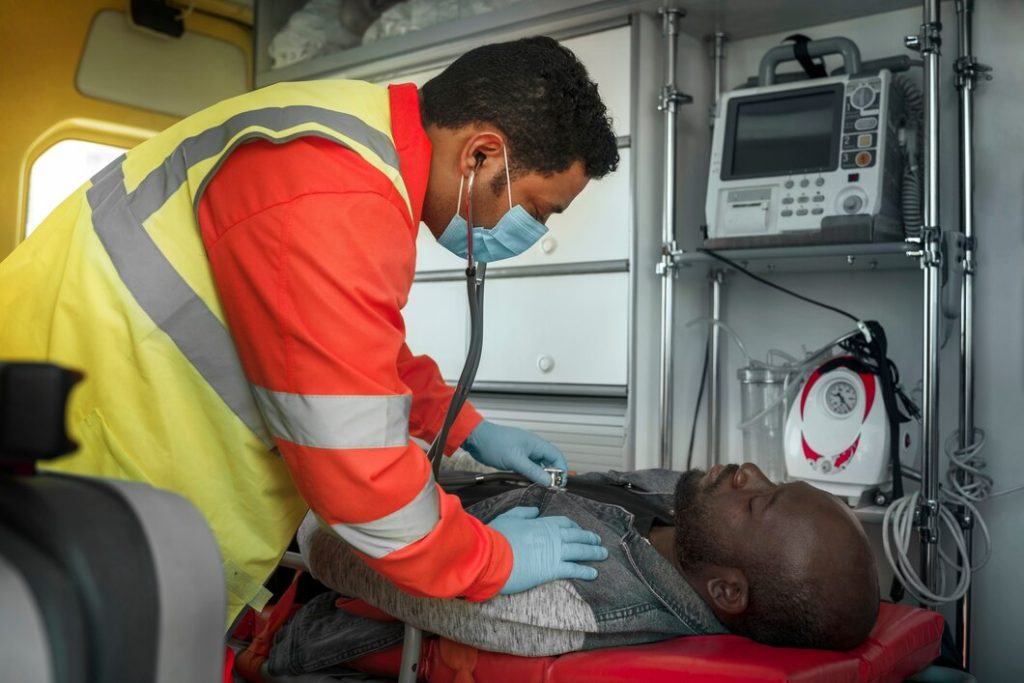Introduction:
Becoming a paramedic is a challenging yet incredibly rewarding career path for individuals who are passionate about emergency medical care and dedicated to helping others in critical situations. Are highly skilled healthcare professionals who provide advanced life support and emergency medical services in pre-hospital settings, such as ambulances, accident scenes, and patients’ homes. If you’re considering this career, here’s a comprehensive guide outlining the steps involved:
1. Fulfill Basic Requirements and Earn a High School Diploma or GED:
The first step is to ensure you meet the basic prerequisites. Generally, this includes being at least 18 years old, possessing a valid driver’s license, and having a clean criminal record. A high school diploma or GED is essential for enrollment in most training programs. Focus on science courses, particularly biology and anatomy, as they will provide a solid foundation for your future studies.
2. Obtain Emergency Medical Technician (EMT) Certification:
In almost all regions, you must first become a certified Emergency Medical Technician (EMT) before you can progress to paramedic training. EMT courses teach essential life-saving skills such as CPR, basic wound care, splinting, oxygen administration, and patient assessment. These courses typically involve classroom instruction, practical skills training, and clinical experience. Upon completion of the EMT course, you must pass a state or national certification exam (often the National Registry of Emergency Medical Technicians – NREMT exam) to become a licensed EMT.
3. Gain Experience as an EMT:
Working as an EMT provides invaluable real-world experience in the emergency medical field. This experience allows you to apply the skills you learned in your EMT course, develop your patient care abilities, and gain confidence in handling emergency situations. Many aspiring paramedics work as EMTs on ambulances, with fire departments, or at private ambulance companies. The experience gained will strengthen your application to paramedic programs and give you a strong foundation for the advanced skills you will learn.
4. Enroll in an Accredited Paramedic Program:
Paramedic programs are significantly more in-depth than EMT courses and cover a wider range of advanced medical procedures and pharmacology. These programs typically last between one to two years and include a combination of classroom lectures, hands-on skills labs, and extensive clinical and field internships.
- Accreditation: Ensure that the paramedic program you choose is accredited by a recognized accrediting body. Accreditation ensures that the program meets specific educational standards and prepares graduates for national certification. The Commission on Accreditation of Allied Health Education Programs (CAAHEP) is a common accrediting body for paramedic programs in the United States.
- Curriculum: Expect to learn about advanced airway management, advanced cardiac life support (ACLS), medication administration

Why Becoming A Paramedic:
Option 1: Focused on Impact and Helping
“Why become a paramedic? The answer often lies in a deep-seated desire to help others in their most vulnerable moments. Paramedics are the frontline medical professionals who respond to emergencies, offering critical care and support during times of crisis. For those drawn to a career of service, where their skills can directly impact lives, the paramedic profession offers a unique opportunity to make a tangible difference. It’s a challenging but incredibly rewarding path, offering the satisfaction of knowing you’ve provided comfort, stability, and potentially life-saving interventions when they are needed most.”
Option 2: Highlighting Variety and Challenge
“Why become a paramedic? It’s not a career for the faint of heart, but for those seeking a dynamic and challenging work environment, it’s an unparalleled opportunity. Every day is different, bringing new situations, new people, and new problems to solve. From responding to motor vehicle accidents and medical emergencies to providing critical care during natural disasters, paramedics face a diverse range of scenarios that require quick thinking, adaptability, and a deep understanding of medical protocols. The constant learning and the need to stay updated on the latest medical advancements keep the job intellectually stimulating, making it a career that is far from routine.”
Option 3: Addressing Personal and Professional Growth
“Why become a paramedic? Beyond the immediate impact on patients, the profession offers significant personal and professional growth. Paramedics develop exceptional problem-solving skills, learn to remain calm under pressure, and cultivate strong communication abilities. The experience gained in the field translates to increased self-confidence and resilience. Furthermore, the paramedic profession can serve as a stepping stone to other healthcare roles, such as nursing, physician assistant, or even medical school. The advanced medical knowledge and hands-on experience provide a solid foundation for further education and career advancement. Ultimately, becoming a paramedic is an investment in oneself, fostering both personal and professional development while making a meaningful contribution to the community.”
Option 4: A More Comprehensive Answer
“Why become a paramedic? The reasons are multifaceted and resonate with individuals seeking a career that is both challenging and profoundly rewarding. At its core, the desire to help others in times of crisis is a primary motivator. Paramedics are the first medical responders on the scene, providing essential care and comfort to those in need. They are often the calm in the storm, offering reassurance and stability during chaotic and frightening situations.
Beyond the altruistic aspect, the paramedic profession offers a dynamic and stimulating work environment. Unlike many traditional office jobs, no two days are ever the same. Paramedics respond to a wide range of emergencies, from




This information was very useful
thank you for reaching out
I have grade 11 and two short courses, I’m interested on this learnerships of
Assistant paramedic
I love to be a paramedic I like to help people
thank you for reaching out
Im interested on assistant paramedic because ilike this job, ilike to help people
That have injuries
thank you reaching out
I really love this job because I love helping people whole heartedly.
thank you for reaching out
I love this Job b because I love assisting people
thank you for reaching out
I’m interested, Because I like to help people & I also want to grow my knowledge.
thank you for reaching out
I’m interested in this Learnership because I like helping people and to save them from injuries, also to improve my knowledge with this job
thank you for reaching out
I really like this job of becoming a paramedic. I hope one day I will become one I also pass my Life sciences and maths lit very well grade 12
THANK YOU